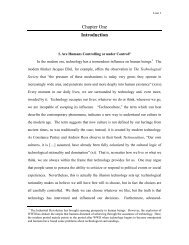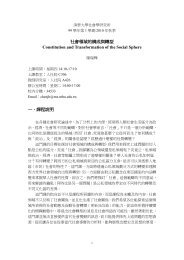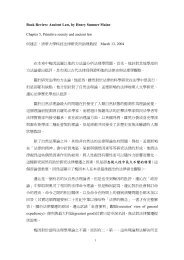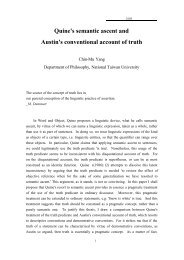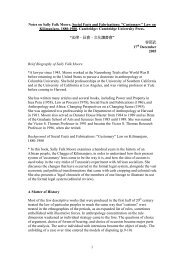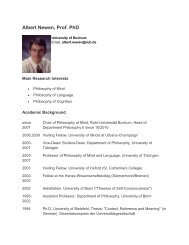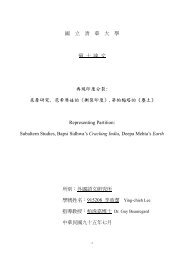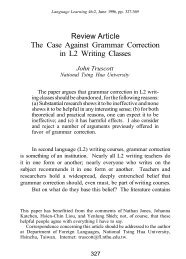Effects of Graded Texts on EFL College Students' Incidental ...
Effects of Graded Texts on EFL College Students' Incidental ...
Effects of Graded Texts on EFL College Students' Incidental ...
Create successful ePaper yourself
Turn your PDF publications into a flip-book with our unique Google optimized e-Paper software.
<strong>on</strong> gloss suggested that they still did not grow out <str<strong>on</strong>g>of</str<strong>on</strong>g> habits in senior high<br />
instructi<strong>on</strong>—intensive reading. From results <str<strong>on</strong>g>of</str<strong>on</strong>g> the background questi<strong>on</strong>naire, it is<br />
found that despite learners’ rich experience in receiving extensive reading instructi<strong>on</strong>s,<br />
very few <str<strong>on</strong>g>of</str<strong>on</strong>g> them have extensive reading habits. Without much practice, their<br />
intensive reading habits were remarkably obvious while reading texts from the <strong>on</strong>-line<br />
reading syllabus. Low tolerance <str<strong>on</strong>g>of</str<strong>on</strong>g> ambiguity was observed as learners tended to<br />
look up every word that they were not completely sure. From the tracking records, it<br />
is shown that learners seldom looked up target words in the bilingual c<strong>on</strong>cordancer,<br />
Totalrecall, for more informati<strong>on</strong> besides Chinese translati<strong>on</strong>. Instead, unglossed<br />
words, including words from the familiar word lists, were the <strong>on</strong>es searched. It is<br />
speculated that instead <str<strong>on</strong>g>of</str<strong>on</strong>g> using extensive reading strategies such as c<strong>on</strong>textual<br />
guessing, learners immediately sought for help whenever they stumbled across<br />
sentences they did not understand. Furthermore, learners had the tendency to make<br />
clear every single sentence before proceeding to read, a habit not encouraged in<br />
extensive reading. This intensive reading habit in turn made reading l<strong>on</strong>g text more<br />
tiresome.<br />
Day and Bamford (1998) pointed out that learners’ previous experiences <strong>on</strong><br />
reading might predispose learners against extensive reading. Since intensive reading,<br />
in which all vocabulary and grammatical patterns were carefully studied within texts,<br />
was the comm<strong>on</strong> in-class practice in Taiwan, learners’ reading habits were difficult to<br />
adjust even with extensive strategy instructi<strong>on</strong> implemented. It is suggested that in<br />
additi<strong>on</strong> to making extensive reading strategies explicit in class, more practice<br />
sessi<strong>on</strong>s should be scheduled as guidance to the extensive reading ability. Moreover,<br />
<strong>on</strong>-going time to time reminders <strong>on</strong> goals and strategies <str<strong>on</strong>g>of</str<strong>on</strong>g> extensive reading could be<br />
emphasized throughout the activity.<br />
One other explanati<strong>on</strong> for the c<strong>on</strong>tradicti<strong>on</strong> <strong>on</strong> the presumably low new word<br />
74



